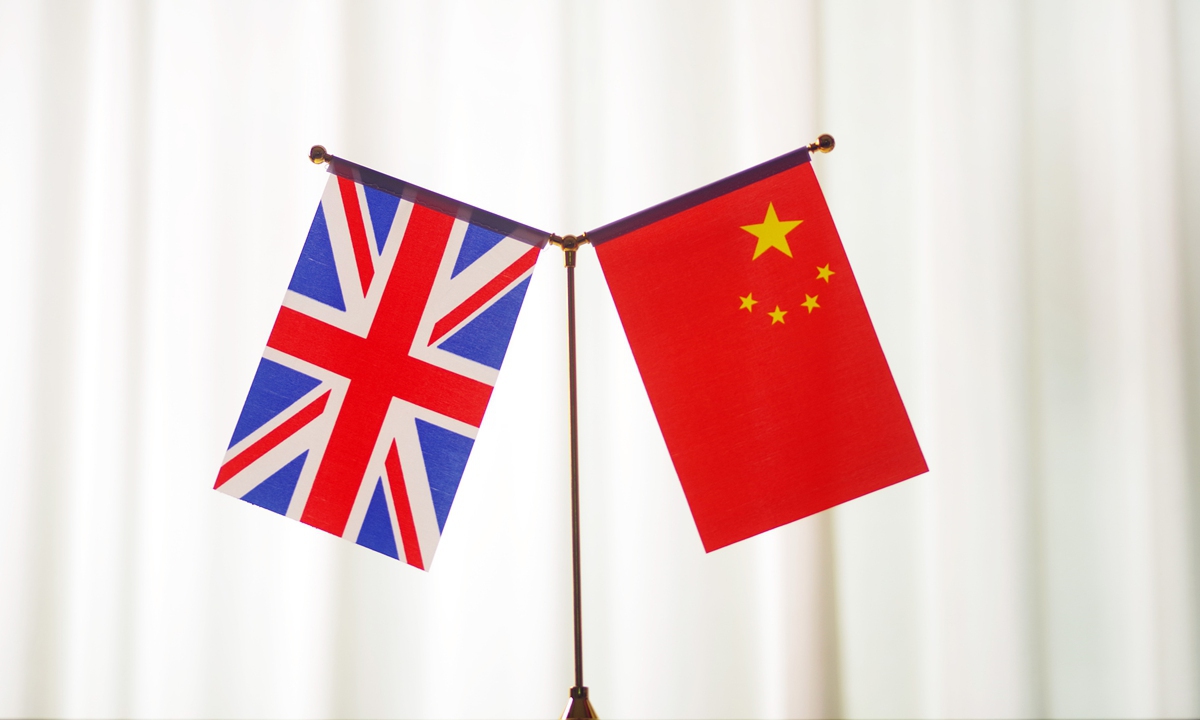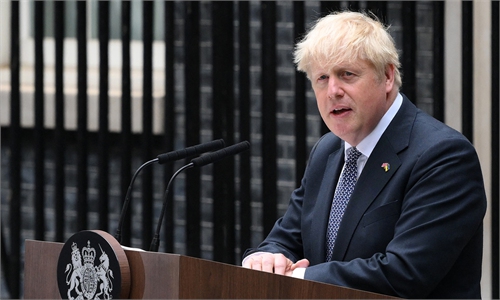China-UK ties ‘might improve’ with arrival of new PM
Most candidates are tough on Beijing, but ‘pragmatic’ one wins first round

China UK Photo: VCG
The UK's Conservative Party is voting for its new leader who will become the successor to Boris Johnson as the country's new prime minister. Most of the candidates hold a tough stance on China, only one of them has a clear and pragmatic view on developing UK-China ties. Chinese experts said the new British prime minister won't make big changes to the current foreign policy, but there is a chance for the UK to fix ties with China and maximize its advantages to prevent an economic downturn.
Former chancellor of the exchequer (finance minister) Rishi Sunak, the one candidate with a pragmatic view of developing balanced ties with China, has won the first round of voting by MPs. He got 88 votes, with Trade Minister Penny Mordaunt in second place on 67 and Foreign Secretary Liz Truss third on 50, according to BBC News.
Incumbent Chancellor of the Exchequer Nadhim Zahawi and former health secretary Jeremy Hunt were eliminated from the race, which means the remaining six hopefuls will face another round of voting on Thursday. The field is expected to be narrowed to two by the end of next week, and then around 160,000 Tory members will decide which candidate they want to become the next party leader and prime minister. The result will be announced on September 5, according to BBC.
When Sunak was the finance minister in July 2021, he used his annual Mansion House speech to insist that Britain should beef up its trading relationship with China, while admitting that efforts to reopen direct access to EU financial services markets had failed, according to the Financial Times.
Wang Yiwei, director of the Institute of International Affairs at Renmin University of China, told the Global Times on Thursday that it's possible to see a "backswing" of the UK toward China, but it's unlikely to return to the "golden era" that former prime minister David Cameron had tried to launch during his tenure.
"In Cameron's tenure, it was the finance ministry that dominated the UK's policy on China, and at that time, they were really interested in cooperating with China in financial services, and after Brexit, from Theresa May to Johnson, the UK has made efforts to try to find new opportunities and markets by standing closer to the US, but the current economic downturn proves that this attempt didn't work very well, so it's likely that the elites in London will eye emerging economies like China and India to make up their losses in Europe after Brexit," Wang said.
Sunak had been downbeat on prospects for a new regulatory deal with the EU, but insisted that the City of London was well placed to serve a fast growing Chinese "financial services market with total assets worth 40 trillion pounds [$47.8 trillion]." He believes the UK can strike a balance in dealing with China between having political differences and boosting cooperation on trade and economy, according to his speech in July 2021, reported by the FT.
But with the world undergoing profound changes, it will be hard for the new prime minister to bring UK-China ties back to the age before Brexit, Wang said. He noted that due to disruption from the US and the anti-China forces in Europe, the China-EU Comprehensive Agreement on Investment has been frozen, so seizing the opportunity to negotiate with China on investment or free trade agreements would be very hard and require great political courage from the UK.
Standing too closer to the US to serve its major power competition strategy will actually weaken the UK, and being too provocative against China won't bring anything good for Britain, so if the new prime minister can return to the policy of mercantilism and pragmatism, the UK will find new opportunities and could become more competitive by improving ties with China, Wang said.
However, it's still uncertain whether the pragmatic candidate will win the election. Sunak has taken the lead in the first round, but due to many other reasons, such as his policy of increasing taxes, which goes against the traditional position of the Conservative Party and its voters who prefer cutting taxes, the Conservative Party might eventually pick a leader that will cut taxes, Yin Zhiguang, a professor at the School of International Relations and Public Affairs under Fudan University, told the Global Times on Thursday.
Apart from Sunak, almost all of the other candidates hold a very tough stance on China, Yin noted. He said that Trade Minister Mordaunt, who's now in second place in the race, could be the most competitive candidate. If she would win, she could be a prime minister who holds an even tougher stance on China than Johnson did.
"It would be difficult for one single person, even if he or she is a party leader and prime minister, to totally change the direction of the entire Conservative Party, and the current election will still be dominated by the long-existing power struggles within the party, so no matter who is eventually elected, it's unlikely there will be very significant changes to the current international situation or to UK ties with China and the US," Yin noted.


